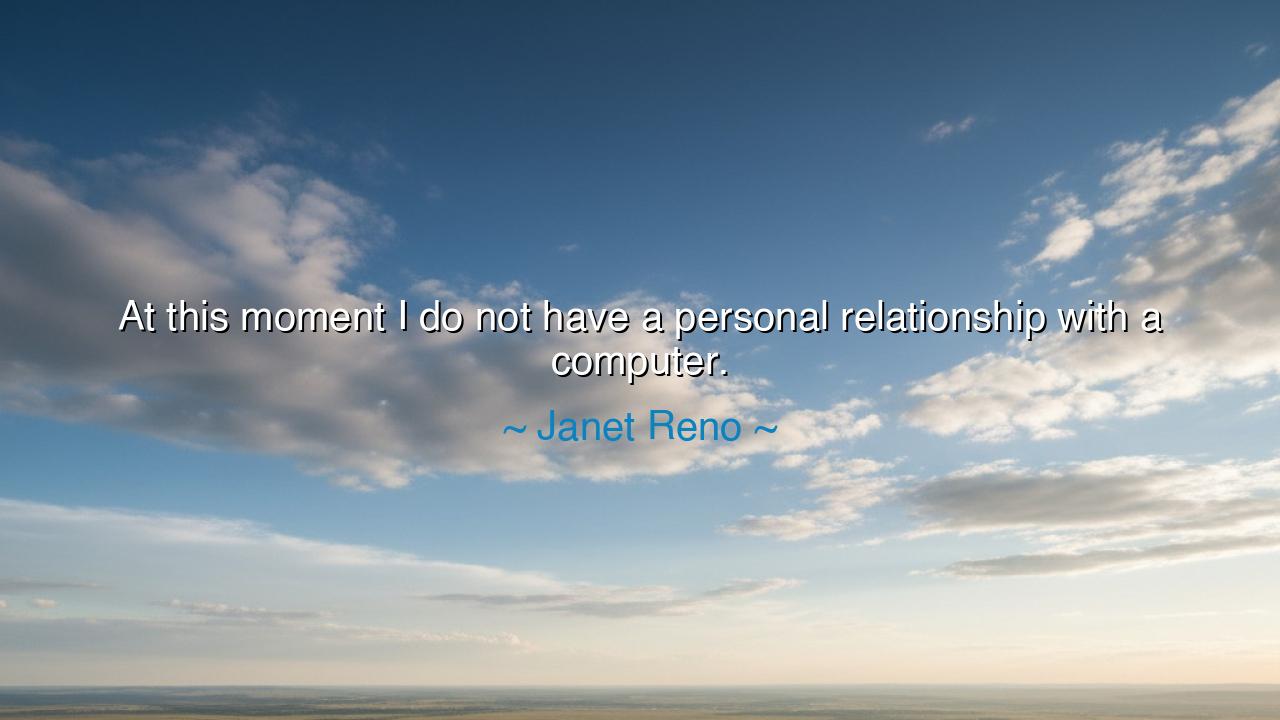
At this moment I do not have a personal relationship with a






The words of Janet Reno, “At this moment I do not have a personal relationship with a computer,” ring with both humility and clarity. In them we hear the voice of one who admits distance from the tools of a new age. She acknowledges that the computer, which for many was becoming a companion of daily life, had not yet woven itself into her own habits. Her statement reflects the eternal truth that every generation must face the meeting of the old with the new, and not all are swift to embrace it.
At the heart of this reflection lies the bond between human and machine. A relationship with a computer is not of affection, but of reliance—when the tool ceases to be external and becomes part of thought and work. Reno’s words confess the absence of this bond, reminding us that mastery of technology is not automatic, but chosen and learned. Her honesty stands as a counterpoint to the age of speed, where many pretend fluency even when it is absent.
The origin of these words rests in the late 20th century, when Reno served as Attorney General of the United States during a time of rapid technological transformation. The computer was reshaping communication, governance, and society itself. Her statement reveals both the challenge of adaptation and the honesty of a leader unafraid to admit her distance from the growing digital tide.
Let this teaching endure: new tools will always rise, demanding that we forge new relationships. Some will embrace them eagerly, others more slowly, but all must recognize their power to reshape the world. Reno’s words remind us that it is no weakness to confess unfamiliarity; rather, it is the first step toward wisdom. For to name the distance is to prepare for the journey, and to admit what we lack is to ready ourselves for growth.






MDMia Duong
I find this quote to be a fascinating reflection on how different generations perceive technology. For those who grew up before the internet, there’s less emotional attachment to devices, but for younger generations, it’s a different story. Does this shift in relationship with technology signal something about society’s evolution? Should we be concerned about forming too close a bond with technology, or is it simply the direction in which we’re heading?
DHDat Ho
Reno's comment strikes me as interesting because it speaks to the potential discomfort or unfamiliarity some people feel toward technology. Could it be that we’re all pressured into forming a ‘relationship’ with our devices, even if we don’t truly want one? How do we maintain a balance between embracing technology and holding onto aspects of life that don’t require constant connectivity? Is it possible to live effectively without feeling that need for a personal relationship with computers?
TLTran Thi Lung
Janet Reno’s words remind me of the ongoing debate about technology's place in our personal lives. On one hand, it’s clear that computers and devices are integral to our daily existence, but on the other hand, Reno's perspective raises an important question: how much is too much? At what point does a ‘relationship’ with technology cross into unhealthy dependence? Can we draw boundaries to keep technology from taking over our personal interactions?
JHjahefea hdwdwjaf
This quote feels like a critique of our growing dependence on technology. Reno’s statement makes me wonder—can we function effectively in today’s world without being immersed in digital spaces? Are we becoming too reliant on computers for everything, from personal relationships to work? Is it possible to stay grounded and human in a tech-heavy world, or is some level of ‘personal relationship’ with technology inevitable?
DBdong Bui
Janet Reno’s quote seems to reflect a perspective on the detachment many people still feel from technology, even as it becomes more ingrained in our lives. It makes me think: Is it possible to maintain a healthy distance from technology in a world so dominated by it? Do we risk losing ourselves if we get too attached, or is it important to form some kind of ‘relationship’ with our devices to stay relevant in modern society?